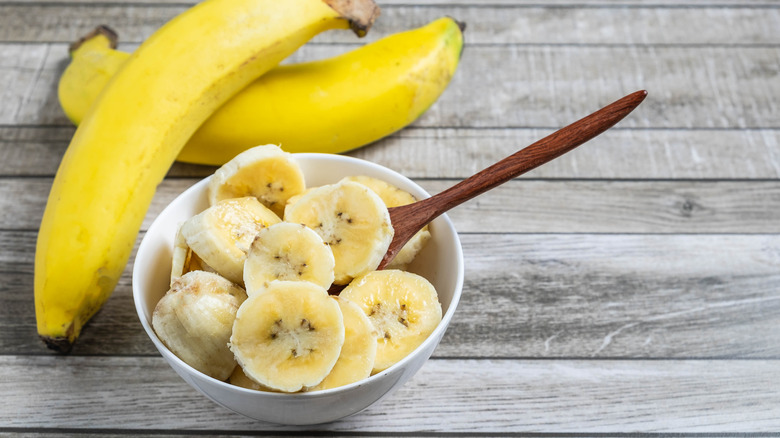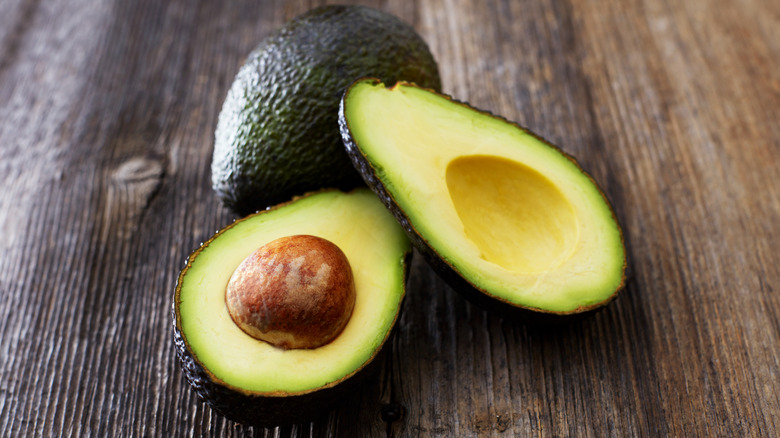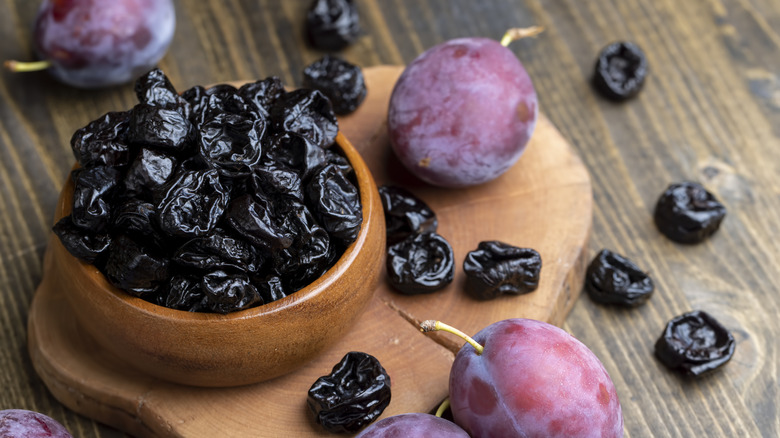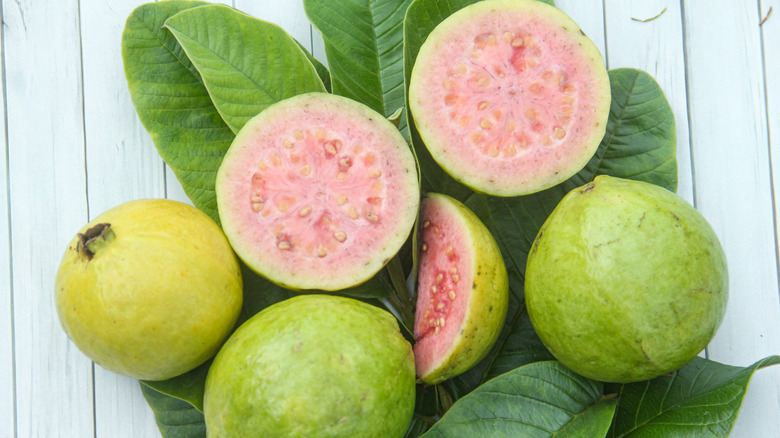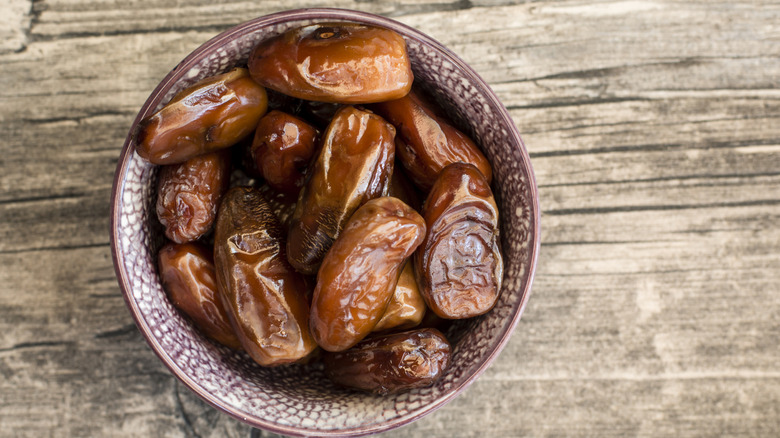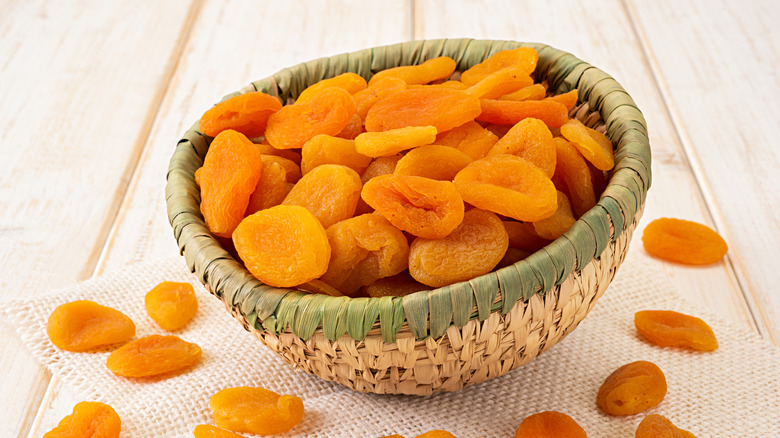5 Fruits With More Potassium Than Bananas
It seems like the moment you mention a nutrient deficiency or ailment in conversations, someone chimes in with a quick fix through food, like eggs for protein or spinach for iron. Almost without fail, bananas come up the moment potassium is mentioned. They're affordable, can be used in many forms, and are ubiquitous. Unsurprisingly, they are among the most widely consumed fruits globally, with over 100 billion bananas eaten annually, and many people, especially athletes, turn to the fruit to maintain high levels of potassium.
Not only does potassium help balance out sodium, but it also helps dial down its not-so-great effects, like high blood pressure, giving your heart a much-needed breather. Potassium is also the magic ingredient that keeps muscle cramps at bay. The U.S. Food and Drug Administration recommends a daily intake of 3,400 milligrams for adult men and 2,600 milligrams for adult women, though pregnant women are advised to aim for 2,900 milligrams. This is why they're considered to be a good source of potassium, as an average small banana contains 358 milligrams of the mineral.
However, depending on a single source to derive your daily dose of potassium can feel medicinal and boring. Though bananas can be used in delicious recipes, some other fruits have a higher potassium content (sometimes much higher!) and can keep your meals more interesting. Five versatile options include avocados, prunes, guavas, dates, and dried apricots. Here are some ways to incorporate them into your diet.
Avocados
Avocados are a superfood packed with nutrients. They are high in antioxidants and excellent for boosting your immune system. Most importantly, they are oh-so delicious. But here's the real bonus — not only are avocados the best ingredient to spread over a nice, crispy toast, but they're also a great option if you want to increase your potassium intake. There are around 576 milligrams of potassium present in every 100 grams of avocados, over 200 milligrams more than bananas. Not to say bananas aren't fun, but there are many unique ways to use avocados, like mixing them in your mayo to make it healthier, creating a creamy frozen dessert, or stirring up some fresh guacamole.
Avocados are also higher in monounsaturated fats and fiber and lower in carbohydrates and sugar than bananas, making them a good alternative for those keeping a check on their carb intake or those with diabetes. It is one fruit that can not only add more variety to your potassium-rich meals, but it is a more well-rounded fruit compared to bananas in terms of nutrients with a high amount of vitamins B, C, E, and K, as well as magnesium and folate.
Prunes
Prunes may not be the most popular of the lot, but when it comes to potassium, they leave bananas in the dust by a long shot. With a whopping 725 milligrams of potassium per 100 grams, prunes pack more than double the potassium of bananas, making them a powerhouse for anyone looking to up their intake. These chewy, naturally sweet gems from the Rosaceae family — the same as apples, pears, and peaches — rank second on our list of potassium-rich fruits. Beyond their impressive potassium levels, prunes are incredibly easy to find in the U.S., since California produces 70% of the world's supply.
The fruit is a secret weapon in the kitchen, too. Sure, you can toss them into smoothies or enjoy them as a quick snack, but their value in savory dishes is underrated and often overlooked. Prunes are a well-kept secret for whipping up some unforgettable barbecue sauce or even a rich beef stew with apples. So, if you're a fan of savory flavors and want to boost your potassium intake beyond bananas, consider this your sign to start cooking with prunes.
Guavas
Most people recognize guavas as a fruit oozing with vitamin C: One guava has more than twice the daily recommendation of the vitamin, making the crunchy fruit practically nectar for your immune system and skin. What many are unaware of is that it also contains an impressive dose of potassium. Every 100 grams contains 417 milligrams of this essential mineral, making guavas a fun and flavorful alternative to bananas. Grown across the world, including the Caribbean, India, and South America, they are blessed with a unique balance of sweetness and acidity, making them a must-try ingredient beyond just fruit bowls.
Much like prunes, the versatility of guavas is seriously underrated when it comes to savory dishes. Sure, they work magic in jams, and it's fun to sprinkle them over your ice cream, but why stop at desserts? They are among the few fruits that can be munched on as snacks with a simple salt seasoning, are an excellent addition to flavored kebabs, and can even be cooked up in a potassium-heavy guava curry. Their naturally sweet and slightly floral flavor pairs well with tangy and spicy ingredients, making them an excellent choice for potassium-seeking candidates looking for variety.
Dates
This naturally sweet treat is more than just delicious. While dates are often recommended for their iron content, they're also a great potassium-packed alternative to bananas, with around 696 milligrams per 100 grams. They're rich in fiber, minerals, and antioxidants and are a good source of calcium and magnesium, making them a smart option to satisfy a sweet tooth or sneak in a nutrient boost between meals. Just be mindful of portion sizes — especially with dried dates, which are high in calories and a prime candidate for unintentional overeating. They might also not be the best option for people with diabetes, as dates are high in sugar.
Though dates are often used as sweeteners, they can be incorporated more interestingly. For instance, dates contain a soluble fiber called pectin, which is a thickener. So you can try tossing a few into your next pot of chili for a hint of subtle sweetness and a rich texture.
Dried apricots
Now that we've built enough suspense, any guesses on the amount of potassium in this alternative to bananas? It is an astounding 1,160 milligrams per 100 grams of dried apricots! That's more than triple the amount of potassium in bananas, making 100 grams enough to fulfill a quarter of your daily potassium requirement.
But don't think you can swap them one-for-one with fresh apricots because their dried counterpart has a significantly higher potassium concentration per serving. They're great as is for a snack and are a powerhouse ingredient worth keeping in your pantry, you can even add dried apricots to chocolate chip cookies.
While bananas are a convenient and delicious way to get your daily dose of potassium, they're far from the only option. These alternatives help meet your daily potassium needs and have added benefits like fiber, antioxidants, and essential minerals. So, the next time you want to increase your potassium intake, you can try a few options from this list and add a fun twist to your meals.
